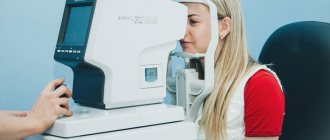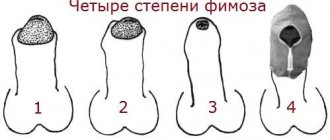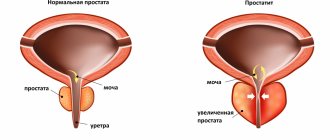What is the name of the doctor who treats eyes?
Eye doctors in our country are traditionally called ophthalmologists. What kind of doctor is this - an ophthalmologist and what are the specifics of his work? In fact, from the point of view of terminology, “ophthalmologist” and “ophthalmologist” are synonyms. The word "oculus" is of Latin origin and means "eye". "Ophthalmos" is also "eye", only in ancient Greek. Thus, there is no difference between the names of professions. Based on the etymology, you can understand what an ophthalmologist means - a doctor who treats eye diseases.
In Western European countries, the term “ophthalmologist” is used. Gradually, Russian clinics are beginning to actively implement it. It would be a misconception to think that an ophthalmologist is a different profession. He does the same thing as an ophthalmologist - he treats the eyes and organs of the visual system. Moreover, any specialist can have a narrower specialization: for example, there are ophthalmological surgeons, pediatric ophthalmologists, etc.
Diagnosis of headaches by a doctor
The first stage of diagnostic testing for cephalalgia is an examination. Experienced specialists are able to make a preliminary diagnosis based on the patient’s clinical picture and medical history.
Local therapists usually treat headaches in patients if the symptom is triggered by changes in blood pressure. In other cases, representatives of narrow specializations come into play.
The following doctors can treat headaches:
- neurologist – will help with pathologies caused by neurological problems. Already the initial examination will allow the doctor to exclude or suspect a number of diseases. These include osteochondrosis and the consequences of brain injuries, increased intracranial pressure and tumors, senile changes in the body, meningitis and much more;
- otolaryngologist - a specialist checks the condition of the ears and sinuses, excludes the presence of otitis media or sinusitis, and, if necessary, begins treatment for these diseases;
- psychotherapist – his consultation is necessary for headaches due to depression, depression, apathy. This doctor is often able to identify the causes of migraines and help prevent attacks;
- dentist - diseases of the teeth and gums, poorly installed crowns and implants, malocclusion can provoke cephalgia;
- orthopedist - diagnosis, conversation and examination by this doctor will help with osteochondrosis and curvature of the spine;
- ophthalmologist – headaches often occur due to excessive eye strain, incorrectly selected glasses or damage to the visual organs;
- reflexologist - carries out manipulations aimed at simulating biologically active points in order to eliminate the symptom. Sessions are carried out as prescribed by other specialists depending on the diagnosis;
- allergist - this doctor should be visited by people who complain of cephalalgia that occurs during a certain season or in response to the influence of some external factors;
- An endocrinologist is a common answer to women’s questions about which doctor to contact for headaches that occur before, during or after a period. Sometimes an alarming sign indicates a decrease in the functionality of the endocrine glands.
In cases where cephalalgia is a secondary symptom, many people understand what disease it is caused by. Then it is better to contact your doctor directly. If there are no prerequisites for a headache, this does not mean that the problem will disappear on its own or that taking analgesics is enough to combat it. In such a situation, it is necessary to go to a therapist and determine the reasons for the appearance of the symptom.
Who is a cephalgologist
In our country, the specialty of cephalologist does not yet officially exist, but this area is being actively developed by enthusiasts. Such a health care worker usually has a training as a neurologist and deals specifically with cases of headaches. The doctor has deep theoretical knowledge in the field of diagnostics and practical skills in the fight against cephalgia. In Western countries, this area is already quite developed, so people with headaches go straight to a specialist.
What does an ophthalmologist treat?
Answering the question of what kind of doctor is an ophthalmologist and what he treats, we will list the most common diseases.
1. Glaucoma.
2. Cataract.
3. Refractive errors - myopia, farsightedness, astigmatism.
4. Strabismus.
5. Ptosis.
6. Retinal diseases (detachment, dystrophy).
7. Injuries to the eyes, eyelids, lacrimal glands.
8. Inflammatory eye diseases (conjunctivitis, keratitis, barley, etc.).
9. Color vision disorders.
10. Hemorrhages.
Many vision problems are caused by diseases of other organs. This means that an ophthalmologist also treats pathologies associated with hypertension, atherosclerosis, diabetes, difficult pregnancy or childbirth, and renal failure.
When should you contact an ophthalmologist?
An ophthalmologist is an eye doctor. Therefore, you need to make an appointment with him if you experience any eye problems. It is better not to delay a visit to the doctor: some diseases that seem not serious, such as conjunctivitis, can have serious complications: inflammation of the cornea, formation of a cataract, decreased vision, etc.
Warning signs for which it is advisable to see an ophthalmologist are:
- pain, burning, severe itching in the eyes;
- redness of the eyelids or eyeball;
- swelling of the eyelids in the absence of objective reasons;
- fog before the eyes;
- double vision;
- painful reaction to light;
- change in the field of view (narrowing, loss of some areas);
- distortion of objects;
- decreased visual acuity;
- increased lacrimation;
- feeling that there is a foreign body in the eye;
- pus discharge from the eyes;
- any injuries.
There are also people who are at risk for developing eye diseases and pathologies. Regular visits to an ophthalmologist (or, in other words, an ophthalmologist) are prescribed for people suffering from diabetes and pregnant women. In addition, diseases of the kidneys, liver, endocrine, and cardiovascular systems can cause serious eye complications. It is recommended that people with a hereditary predisposition to the diseases listed above have their eye condition checked at least once a year.
Many regenerative processes are associated with age-related changes. People over 45 years of age need to be careful about their eyes and get doctors' recommendations on how to preserve their vision (gymnastics, vitamins, moisturizing drops, etc.). Knowing what an ophthalmologist is treating is also important for patients who are undergoing a long course of hormonal therapy. An excess of hormones can lead to exophthalmos (protrusion of the eyes) or diabetic retinopathy (the blood vessels of the fundus grow abnormally, the retina is damaged, and vision decreases).
When to seek help from a doctor
Many people ignore systematic headaches or practice self-treatment. Practice shows that urgent professional medical assistance is necessary in 5 cases out of 100 calls. Of the remaining 95 situations, 90 require complex conservative treatment. Only the last 5 do not require a drug approach or changes in the patient's regimen.
Urgent medical care is necessary if you have a headache and the condition is complicated by the following:
- children (up to 16 years) or old age (after 50 years) - in the latter case, it is necessary to exclude the possibility of a tumor and temporal arteritis;
You will learn more about pain localized in the temples and possible pathologies here.
- the sensations are intense and look like small “explosions” or “rumbles” in the skull - there is a risk of subarachnoid hemorrhage;
- there is pain in the joints or muscles, the temperature has risen;
- there is an aura that persists for more than 60 minutes or is accompanied by impaired motor activity - characteristic of a stroke;
You will learn about the first signs of a stroke in this article.
- sensations appeared for the first time in a woman who is taking oral contraceptives - a risk factor for stroke;
- the pain gradually increases and persists for days and even weeks - the growth of a tumor inside the skull;
- the symptom worsens in response to changes in body position, sneezing, coughing, physical activity - there is a possibility of a tumor;
- history of HIV, AIDS, oncology;
- cephalalgia is accompanied by a change in perception or disturbance of consciousness;
- the symptom does not disappear after taking medications, rest, or physical therapy.
Modern men and women refuse professional help for various reasons. Some people think that by going to the doctor with such a “ridiculous” problem, they will look stupid. Others are confident that the symptom cannot be a sign of something serious. This attitude of people towards their health often causes the development of chronic or emergency conditions that could have been prevented.
Diagnostic methods
Now that we have figured out what kind of doctor an ophthalmologist is, let's look at what diagnostic methods he uses. The first step is a visual examination, but then the doctor can use a whole arsenal of modern diagnostic equipment to select the optimal treatment.
An ophthalmologist diagnoses eye diseases using the following methods:
- tonometry - measurement of intraocular pressure;
- refractometry - a study of refraction to identify myopia, farsightedness, astigmatism;
- visometry - a study of visual acuity familiar to everyone from childhood using tables with letters/images;
- color test to determine the ability to distinguish shades;
- ultrasound and optical biometry - study of the physical characteristics of the eye, the condition of the cornea and lens;
- ophthalmoscopy - examination of the eye using an ophthalmoscope, which allows you to examine the internal structures of the eye;
- biomicroscopy - study of the structure of the eye using a slit lamp;
- angiography - examination of the condition of the blood vessels of the eye by introducing a special dye;
- tonography - measurement of the rate of outflow of aqueous humor, necessary for glaucoma.
What does an ophthalmologist do and what treatment methods does he use?
The choice of treatment method depends on the specific disease. Typically, a general ophthalmologist will prescribe local or general treatment, eye exercises and physical therapy. But surgical intervention is carried out by ophthalmologist-surgeons - specialists who own modern minimally invasive equipment for performing operations on the eyeball
| Type of treatment | When is it appointed? | Methods |
| Local | Prescribed for diseases of the anterior part of the eyeball, as well as inflammation of the eyelids and lacrimal glands | Instillation of eye drops, application of ointments, lubrication of the ciliary edge of the eyelids, periocular injections. |
| General | It is used for severe eye diseases, especially those caused by infections and viruses. | Taking orally, intramuscularly or intravenously anti-inflammatory, antibacterial, antihistamine, strengthening drugs. |
| Surgical | Surgeries are prescribed in cases where conservative methods do not work. Also, surgical intervention allows you to permanently get rid of myopia, farsightedness or astigmatism (however, the procedure has serious contraindications). | Laser vision correction, laser treatment of glaucoma, trabeculectomy, lens replacement, scleroplasty, corneal transplant, etc. |
| Physiotherapy | Effective for improving blood circulation, reducing swelling, and activating biochemically active substances. As a rule, it is an auxiliary method and is used only in conjunction with general therapy | Electrotherapy, phototherapy, mechanical therapy and barotherapy. |
| Gymnastics for the eyes | Necessary to relieve tension and normalize blood flow to the eyeballs. Excellent for coping with dry eye syndrome. It can be effective in preventing vision loss. | Exercises according to U.G. Beitu, M.D. Corbett, Professor Zhdanov and many other types of gymnastics. |
Vision testing in children
You can explain to your children which doctor treats eyes and what another name an ophthalmologist is by making an appointment with the doctor. Vision testing in children should be carried out regularly: at a younger age, it will make sure that the child does not have congenital pathologies and the development of the visual organs is in accordance with the norm, and at an older age, it will prevent the development of myopia. The most vulnerable age for myopathy is 8-14 years, when eye strain increases sharply, and children are not yet accustomed to maintaining workplace hygiene.
Children with poor heredity should definitely visit an ophthalmologist.
In childhood, it is easier to identify and treat many disorders - astigmatism, strabismus, farsightedness, myopia, etc. Timely prescription of correction will avoid the development of other diseases - strabismus and amblyopia. It is advisable for children to see an ophthalmologist at least once a year. Ophthalmologists of the Lensmaster chain of salons specialize in refractive error and eye accommodation, so they can choose suitable glasses or contact lenses even for people with serious impairments. There are children's specialists who are ready to conduct a full vision examination of children from 7 years of age. You can make an appointment in Moscow, St. Petersburg, Rostov-on-Don and other cities of Russia through the online form.
Select attending physician 30
- Noise in ears
- Headache
- General weakness
- Convulsions
- Dizziness
- Speech Impairment
- Impaired movement coordination
- Pain in the eyes
- Double vision
- Numbness of the face
- Anxiety
- Photophobia
- Hearing loss
- Decreased vision
- Urination disorder
- Anxiety
- Paralysis of facial muscles on one side
- Changing the shape of the pupil
- Vomit.
If you find similar signs in yourself, do not wait, consult a doctor immediately!
A neurologist specializes in treating diseases of the nervous system. Preparing for a consultation with a neurologist involves collecting information on your disease. The doctor will need to provide all the results of the examinations and expert opinions. If at the time of the examination the patient is taking any medications, this must also be reported. For greater objectivity, on the eve of your appointment, you should refrain from drinking alcohol and smoking. They can affect the neurological status and lead to overdiagnosis.
Headache, increased fatigue, decreased concentration, general lethargy and passivity - all these manifestations are most often attributed to a cold, hormonal imbalance or the so-called chronic fatigue syndrome. But if they occur over a long period of time, becoming more and more pronounced, or the clinical picture expands with additional symptoms, it is necessary to urgently go to the clinic and undergo an examination. It is quite possible that this is cerebral atherosclerosis.
How to treat this disease? Like any other ailment of the cardiovascular system, this one requires an individual and at the same time comprehensive approach. The main thing is not to self-medicate, since a mistake in choosing medications can lead to serious and irreversible consequences.











